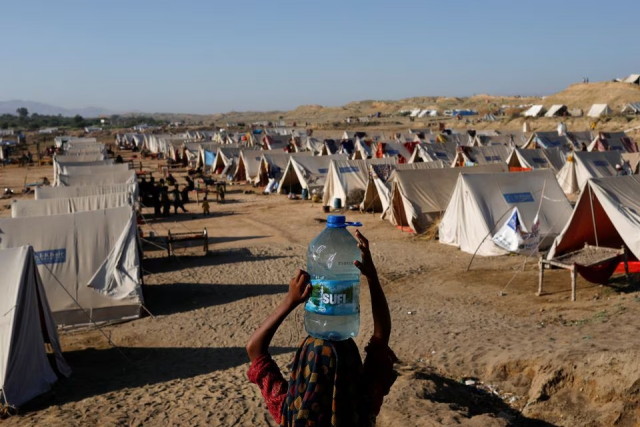As Pakistan's new cabinet took their oaths, the absence of key ministries dedicated to health and climate sent a disheartening message — a message that speaks volumes about the priorities of our government and the value placed on the well-being of the most vulnerable among us.
Let's call it what it is: an oversight with consequences. By neglecting to include the health and climate ministries in the first round of cabinet oath-taking, our leaders have missed a crucial opportunity to signal their unwavering commitment to addressing two of the most pressing challenges facing our nation: the health crisis and the climate emergency.
Consider the stark realities facing Pakistan's poor and climate-vulnerable populations. From the sweltering heatwaves that claim lives every summer to the devastating floods that displace entire towns and communities, the impacts of climate change are not abstract concepts but harsh realities that millions of Pakistanis cope with daily.
According to data from the Pakistan Meteorological Department, heatwaves have become more frequent and intense in recent years, with temperatures exceeding 50 degrees in some regions, leading to heat-related illnesses like heat stroke and subsequent fatalities. In 2023 alone, over 1,500 heat-related deaths were reported, with vulnerable populations such as the elderly and labourers disproportionately affected.
And yet, in a decision that defies logic and empathy, the very ministries tasked with spearheading efforts to mitigate these existential threats were side-lined. This sends a clear message: the well-being of the poor and climate-vulnerable is not a top priority for our government — at least not in the initial stages of cabinet formation.
Furthermore, Pakistan ranks among the top 10 countries most affected by climate change, with recurring floods, droughts, and extreme weather events wreaking havoc on communities and infrastructure. According to the Global Climate Risk Index, Pakistan experienced the fifth-highest number of climate-related fatalities between 2000 and 2019, highlighting the urgent need for comprehensive climate adaptation and mitigation strategies.
However, the consequences of this oversight will be felt far and wide. Without strong leadership and dedicated resources, our ability to respond effectively to health crises and climate-related disasters will be severely compromised. Vulnerable communities will continue to bear the brunt of these crises, left to fend for themselves in the face of unprecedented challenges.
For instance, during the 2023 floods in Sindh, thousands of families were displaced, with limited access to clean water, sanitation, and healthcare services. The absence of coordinated government efforts intensified the suffering of these communities, leaving them vulnerable to waterborne diseases and malnutrition.
Moreover, the exclusion of health and climate ministries from the cabinet oath-taking sets a troubling precedent — a precedent that suggests that these critical issues are not worthy of the same level of attention and urgency as other governmental priorities. This sends a chilling message to those on the front lines of the fight against disease and environmental degradation: their efforts are undervalued and their voices silenced.
According to a survey conducted by Oxfam Pakistan, 80% of respondents expressed concern about the government's inadequate response to climate change, citing a lack of resources, coordination, and political will. This underscores the urgent need for inclusive policymaking that prioritises the voices and needs of marginalised communities.
But let us not resign ourselves to despair. Instead, let us use this moment as a rallying cry for change. Let us demand accountability from our leaders, insisting that the well-being of all Pakistanis, regardless of their socioeconomic status or geographic location, be placed at the forefront of policymaking.
Civil society organisations such as the Pakistan Medical Association and the Climate Action Network Pakistan have called for urgent action to address the intersecting challenges of health and climate change, urging the government to allocate sufficient resources and establish effective coordination mechanisms to tackle these crises.
Let us call upon our government to rectify this oversight immediately, ensuring that the health and climate ministries are given the prominence and resources they need to effectively address the challenges ahead.
In the end, the true measure of a society's progress is not the wealth of its elites or the power of its institutions but the well-being of its most vulnerable members. Until we prioritise the health and resilience of those most in need, our journey towards a more just and sustainable future will remain incomplete.



COMMENTS
Comments are moderated and generally will be posted if they are on-topic and not abusive.
For more information, please see our Comments FAQ